Cold Weather Camping Hacks
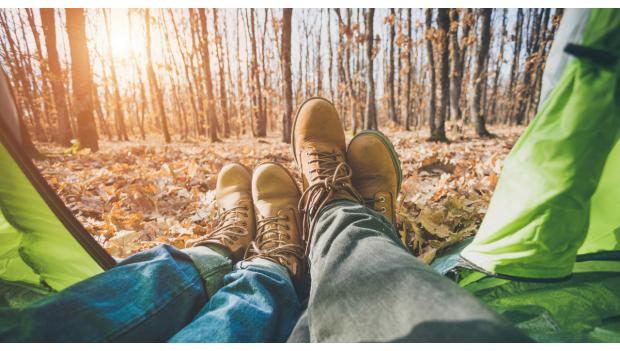 The leaves are changing and the days are growing cooler, but that doesn’t mean that camping season needs to come to an end. Even during the bitter cold, camping can still be enjoyable. These cold weather camping hacks will help you stay comfortable no matter how low the temperature drops.
The leaves are changing and the days are growing cooler, but that doesn’t mean that camping season needs to come to an end. Even during the bitter cold, camping can still be enjoyable. These cold weather camping hacks will help you stay comfortable no matter how low the temperature drops.
Book your favorite campsite reservation, then follow our insider tips.
These are the ultimate cold weather camping hacks.
1. Use a 4-season tent
If your winter camping adventures take place in a tent, make sure that your tent is designed for cold weather camping. Many tents, especially those that are sold at big box stores, are only 3-season tents. That’s okay for spring, summer and fall, but you’ll need something a little more robust in the cold winter months. A 4-season tent is designed to stand strong in any type of weather, including snow. The tent body is made out of a more durable polyester or nylon and is usually without mesh. The rain fly extends further away from the tent and does a better job of blocking out the elements, and the frame and poles are more durable. If you’re camping in the cold, a 4-season tent is the only choice.
2. Winterize your RV
Many RVs go south for the winter. But if you plan to camp in cold weather up north, make sure your RV is properly winterized. This includes draining your water tanks and lines, adding antifreeze where appropriate and installing insulation where necessary—like around doors, windows and storage compartments. To keep your feet warm, line the floor of your RV with rugs.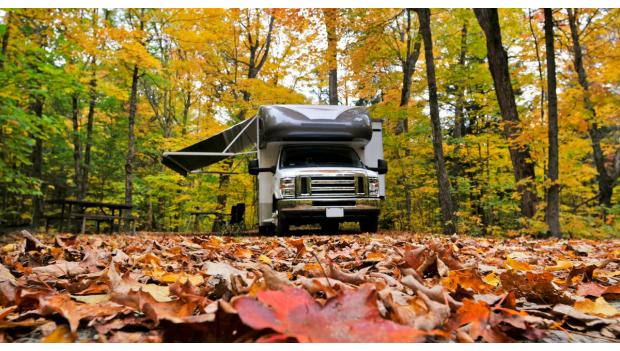
Want to go camping? Find the best RV rentals in America.
3. Don’t kill your batteries
Cold weather can drain batteries quickly, so beware of the risk so you don’t end up with a dead piece of essential gear. To prolong the life of your battery-powered gear, like your headlamp, stuff your gear inside your sleeping bag before you hit the hay. Not only will you know where to find it should you need it in the night, but your body heat will keep the battery from draining.
4. Hack your campfire
Campfires add ambiance year-round, but during winter campouts, they’re necessary to stay warm. If it’s been snowing, remember that firewood may be wet or frozen. To easily start a fire despite the weather, soak cotton balls in petroleum jelly before your trip. Then use the cotton balls as a quick and efficient fire starter. It’s also important to build a fire that will release the maximum amount of heat by building a fire as tall as it is wide. This ensures there is plenty of oxygen to feed the fire, producing a hotter burn that will keep you warm. If you plan to stoke your fire all night long, place your tent as close to the fire as possible for added warmth (but not so close that you risk catching your tent on fire!).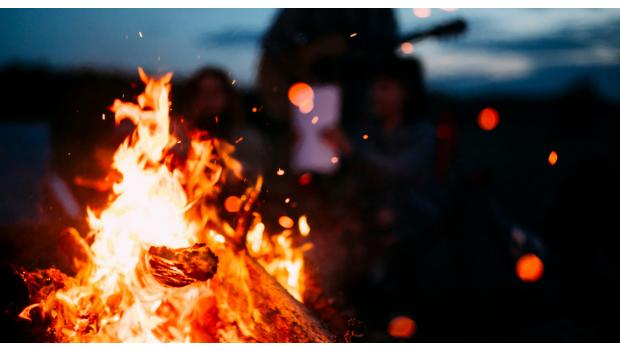
5. Wave goodbye to air mattresses
Many campers sleep on air mattresses during warmer months, but air mattresses are a big no-no when it’s cold outside. That’s because the air inside the mattress will turn cold and keep you cold. In the winter, sleep on an insulated ground pad instead. The pad will trap your body heat, adding an insulating layer between you and the freezing ground below.
6. Stake your tent with rocks
On the coldest days of the year it will be impossible to drive a tent stake into the ground. Instead of worrying about how you’ll get that stake into the soil, consider the alternatives. One easy way to stake your tent is to loop your tent’s guy-lines around fist-sized rocks. The rocks act as above-ground stakes and will keep your tent standing in all but the windiest conditions.
7. Keep your clothes warm
No one likes to wake up from a night of camping and climb into freezing cold clothes. To prevent that chilling feeling, stuff the clothes you plan to wear the next morning deep inside of your sleeping bag. They’ll warm up with your body heat and you’ll be able to dress comfortably.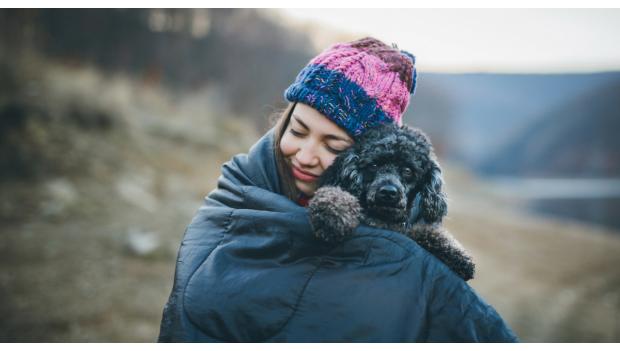
Are you planning a camping trip? Book your campsite reservation.
8. Open tent vents to avoid condensation
The warmth of your breath on a cold night can produce condensation in your tent, causing the inside of your tent to get wet and freeze. To avoid creating excess condensation, keep the vents in your tent open, even on the coldest nights.
9. Avoid down sleeping bags
Sleeping bags made with down don’t retain heat once they are wet—a recipe for disaster in cold weather. When camping in the cold, use a sleeping bag made with synesthetic materials or water repellant down which will stay warm and dry even when wet.
10. Use a small tent
While it’s nice to have a roomy tent to stand up in, when it comes to cold weather camping, the smaller the tent the better. That’s because the tight space will heat up much quicker with body heat and keep you and the others in the tent warmer overnight.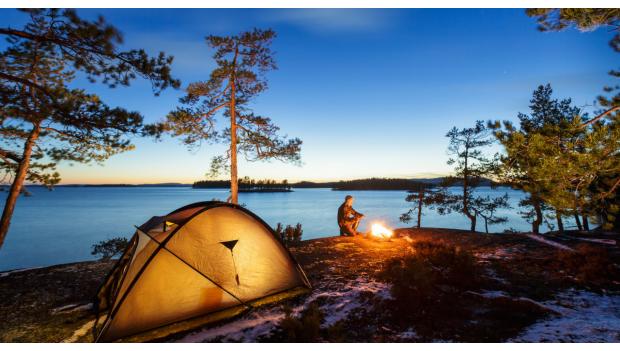
11. Don’t wear cotton
Cotton clothing becomes heavy and dries slowly when wet. Avoid cotton clothing when cold weather camping, and instead wear synthetic materials that retain heat and dry quickly. Check to make sure that your hats, gloves and socks are also synthetic. All of your clothing and accessories should keep you warm in harsh conditions.
12. Sleep with a warm water bottle
A classic camping hack is to boil water over the campfire and then pour the hot water into your reusable water bottle. That water bottle can then be closed tightly and placed in your sleeping bag twenty minutes before going to sleep. This will give you a cozy sleeping bag to climb into.
13. Buy a new heater
If you’re an RV camper it’s important to know that the propane furnaces that come factory installed in most RVs are not very effective or efficient. If you’ll be camping at a campsite with hookups, consider buying an electric space heater that you can plug in. If you won’t have electricity, vent-free propane heaters are also an option. They’ll don’t require electricity, so you can use them anywhere.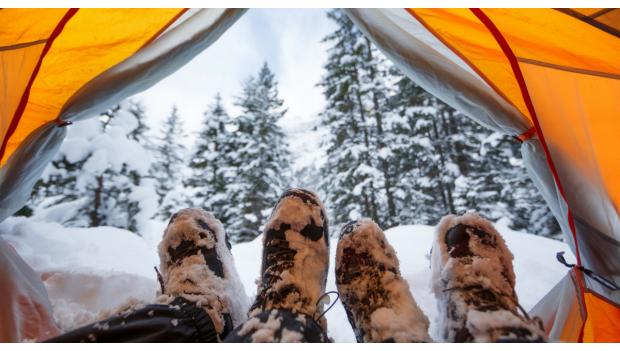
Are you ready for an outdoor adventure? Plan your camping trip.